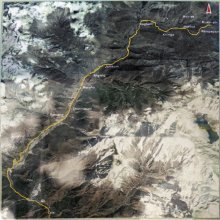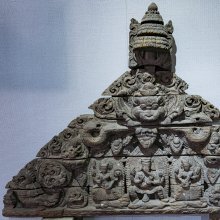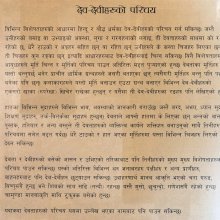Pracina, Prācīnā: 17 definitions
Introduction:
Pracina means something in Hinduism, Sanskrit, Marathi, Hindi, biology. If you want to know the exact meaning, history, etymology or English translation of this term then check out the descriptions on this page. Add your comment or reference to a book if you want to contribute to this summary article.
Alternative spellings of this word include Prachina.
Images (photo gallery)
In Hinduism
Ayurveda (science of life)
Source: Wisdom Library: Āyurveda and botanyPrācīnā (प्राचीना) is another name (synonym) for Pāṭhā, which is a Sanskrit name for the plant Cissampelos pareira (velvetleaf). This synonym was identified by Narahari in his 13th-century Rājanighaṇṭu (verses 6.119-121), which is an Ayurvedic medicinal thesaurus.

Āyurveda (आयुर्वेद, ayurveda) is a branch of Indian science dealing with medicine, herbalism, taxology, anatomy, surgery, alchemy and related topics. Traditional practice of Āyurveda in ancient India dates back to at least the first millenium BC. Literature is commonly written in Sanskrit using various poetic metres.
Yoga (school of philosophy)
Source: ORA: Amanaska (king of all yogas): A Critical Edition and Annotated Translation by Jason BirchPrācīna (प्राचीन) refers to “former (attachments)”, according to the Yogatārāvalī.—Accordingly, [while describing yoganidrā]: “[This] extraordinary sleep [which is] without dullness and void of thought [that is the world of] multiplicity, becomes manifest for people when [all their] former attachments (prācīna-saṅga) have been defeated by the superiority of [their] inward awareness. [...]”.

Yoga is originally considered a branch of Hindu philosophy (astika), but both ancient and modern Yoga combine the physical, mental and spiritual. Yoga teaches various physical techniques also known as āsanas (postures), used for various purposes (eg., meditation, contemplation, relaxation).
Biology (plants and animals)
Source: Wisdom Library: Local Names of Plants and DrugsPracina [प्राचीन] in the Sanskrit language is the name of a plant identified with Cocculus hirsutus from the Menispermaceae (Moonseed) family having the following synonyms: Cocculus villosus. For the possible medicinal usage of pracina, you can check this page for potential sources and references, although be aware that any some or none of the side-effects may not be mentioned here, wether they be harmful or beneficial to health.
Source: Google Books: CRC World Dictionary (Regional names)Pracina in India is the name of a plant defined with Cissampelos pareira in various botanical sources. This page contains potential references in Ayurveda, modern medicine, and other folk traditions or local practices It has the synonym Cocculus orbiculatus C.K. Schneid., nom. illeg. (among others).
Example references for further research on medicinal uses or toxicity (see latin names for full list):
· Species Plantarum (1753)
· Nova Genera et Species Plantarum (1821)
· Amaltheum botanicum (1705)
· Hortus Bengalensis, or ‘a Catalogue of the Plants Growing in the Hounourable East India Company's Botanical Garden at Calcutta’ (1814)
· Flora Japonica (Thunberg) (1784)
· Florae Fluminensis Icones
If you are looking for specific details regarding Pracina, for example chemical composition, side effects, health benefits, diet and recipes, extract dosage, pregnancy safety, have a look at these references.

This sections includes definitions from the five kingdoms of living things: Animals, Plants, Fungi, Protists and Monera. It will include both the official binomial nomenclature (scientific names usually in Latin) as well as regional spellings and variants.
Languages of India and abroad
Marathi-English dictionary
Source: DDSA: The Molesworth Marathi and English Dictionaryprācīna (प्राचीन).—a (S) Eastern. 2 Former, prior, primitive.
Source: DDSA: The Aryabhusan school dictionary, Marathi-Englishprācīna (प्राचीन).—a Eastern. Former, prior, primitive.
Marathi is an Indo-European language having over 70 million native speakers people in (predominantly) Maharashtra India. Marathi, like many other Indo-Aryan languages, evolved from early forms of Prakrit, which itself is a subset of Sanskrit, one of the most ancient languages of the world.
Sanskrit dictionary
Source: DDSA: The practical Sanskrit-English dictionaryPrācīna (प्राचीन).—a. [prāc bhavārthe kha]
1) Turned towards the front or east, eastern, easterly.
2) Previous, former, previously mentioned.
3) Old, ancient.
-naḥ, -nam 1 A fence, wall.
2) The eastern country; प्राचीनवाहिनीं चैव नदीं भृशम- कर्दमाम् (prācīnavāhinīṃ caiva nadīṃ bhṛśama- kardamām) Rām.4.27.16.
-nam ind.
1) In front.
2) Eastward (abl.)
3) Before.
Source: Cologne Digital Sanskrit Dictionaries: Shabda-Sagara Sanskrit-English DictionaryPrācīna (प्राचीन).—mfn.
(-naḥ-nā-naṃ) 1. East, eastern. 2. Former, prior, ancient, old. 3. Placed towards the east. fn.
(-nā-naṃ) A bound hedge, a fence, a wall. f.
(-nā) 1. A plant, (Cissampelos hexandra.) 2. The ichneumon plant: see rāsnā. E. prāk the east, aff. kha.
Source: Cologne Digital Sanskrit Dictionaries: Benfey Sanskrit-English DictionaryPrācīna (प्राचीन).—i. e. prāñc + īna, adj. 1. Former, old. 2. Eastern, east. 3. Left, not right, [Mānavadharmaśāstra] 2, 63 ([Kullūka Schol. ed. [Mānavadharmaśāstra]]).
Source: Cologne Digital Sanskrit Dictionaries: Cappeller Sanskrit-English DictionaryPrācīna (प्राचीन).—[adjective] turned forward or eastward; former, prior, ancient, old; [neuter] [adverb] forwards, in front or to the east of, before ([ablative]).
Source: Cologne Digital Sanskrit Dictionaries: Monier-Williams Sanskrit-English Dictionary1) Prācīna (प्राचीन):—a etc. See p. 704, col. 3.
2) [from prāñc] b mf(ā)n. turned towards the front or eastward, eastern, easterly, [Ṛg-veda; Taittirīya-saṃhitā; Brāhmaṇa] etc.
3) [v.s. ...] former, prior, preceding. ancient, old, [Manu-smṛti; Manvarthamuktāvalī, kullūka bhaṭṭa’s Commentary on manu-smṛti; Hāyana-ratna, by Balabhadra]
4) [v.s. ...] m. n. a hedge (= prācīra), [cf. Lexicographers, esp. such as amarasiṃha, halāyudha, hemacandra, etc.]
5) Prācīnā (प्राचीना):—[from prācīna > prāñc] f. Clypea Hernandifolia, [cf. Lexicographers, esp. such as amarasiṃha, halāyudha, hemacandra, etc.]
6) [v.s. ...] the Ichneumon plant, [cf. Lexicographers, esp. such as amarasiṃha, halāyudha, hemacandra, etc.]
7) Prācīna (प्राचीन):—[from prāñc] n. Name of a Sāman, [Ārṣeya-brāhmaṇa]
8) [from prāñc] n. subsequently (ataḥ-p, ‘further on from that point’), [Śatapatha-brāhmaṇa]
Source: Cologne Digital Sanskrit Dictionaries: Yates Sanskrit-English DictionaryPrācīna (प्राचीन):—[(naḥ-nā-naṃ) a.] Eastern; former, ancient. f. n. A fence, a wall. f. A plant; an ichneumon.
Source: DDSA: Paia-sadda-mahannavo; a comprehensive Prakrit Hindi dictionary (S)Prācīna (प्राचीन) in the Sanskrit language is related to the Prakrit words: Pāīṇa, Pāīṇā.
[Sanskrit to German]
Sanskrit, also spelled संस्कृतम् (saṃskṛtam), is an ancient language of India commonly seen as the grandmother of the Indo-European language family (even English!). Closely allied with Prakrit and Pali, Sanskrit is more exhaustive in both grammar and terms and has the most extensive collection of literature in the world, greatly surpassing its sister-languages Greek and Latin.
Hindi dictionary
Source: DDSA: A practical Hindi-English dictionaryPrācīna (प्राचीन) [Also spelled prachin]:—(a) ancient; old; outdated; antique; —[kathā] an ancient tale/story; ~[tara] older; more ancient; earlier; ~[tama] oldest, most ancient; earliest; ~[tā] antiquity, ancientness; •[-prema] love of antiquity; archaism; primitivism; ~[tā-premī] a lover of antiquity; archaist; primitivist.
...
Kannada-English dictionary
Source: Alar: Kannada-English corpusPrācīna (ಪ್ರಾಚೀನ):—
1) [adjective] in, of, to, toward or facing the east; eastern.
2) [adjective] of times long past; belonging to the early history of the world; ancient.
--- OR ---
Prācīna (ಪ್ರಾಚೀನ):—
1) [noun] anything that is belonging to ancient times.
2) [noun] a thing that belongs to, is generated in east.
3) [noun] the deed or deeds of one’s past life or its effect experienced during the present life.
4) [noun] the reverse way of wearing the sacrificial thread (over the right shoulder and under the left arm, as during the ceremony of death anniversary of one’s parents).
5) [noun] an enclosing wall or fence.
6) [noun] an old man.
Kannada is a Dravidian language (as opposed to the Indo-European language family) mainly spoken in the southwestern region of India.
See also (Relevant definitions)
Starts with (+37): Pracina Dori, Pracina-smaraka, Pracinaavitin, Pracinabarhi, Pracinabarhis, Pracinabarhisha, Pracinagarbha, Pracinagatha, Pracinagauda, Pracinagra, Pracinagriva, Pracinagurupranali, Pracinaharana, Pracinakala, Pracinakalpa, Pracinakarma, Pracinakarna, Pracinakula, Pracinam, Pracinamalaka.
Ends with: Apracina, Atipracina, Sarvapracina.
Full-text (+55): Paina, Pracinatilaka, Pracinapanasa, Pracinavita, Pracinamalaka, Apracina, Pracinamula, Pracinagatha, Pracinakalpa, Pracinamata, Pracinagra, Pracinavitin, Pracinam, Pracinabarhis, Pracinopavita, Pragbhara, Avitin, Pracinaprajanana, Pracinagriva, Pracinakarma.
Relevant text
Search found 28 books and stories containing Pracina, Prācīnā, Prācīna; (plurals include: Pracinas, Prācīnās, Prācīnas). You can also click to the full overview containing English textual excerpts. Below are direct links for the most relevant articles:
Rig Veda (translation and commentary) (by H. H. Wilson)
Sanskrit sources of Kerala history (by Suma Parappattoli)
Sridhara of Suresvara family inscription (Thiruvalathur) < [Chapter 1 - Historical details from Sanskrit Inscriptions]
Vakyapadiya of Bhartrihari (by K. A. Subramania Iyer)
Verse 2.246 < [Book 2 - Vākya-kāṇḍa]
Soma in Vedic Mythology and Ritual (study) (by Anjana Chakraborty)
Amarakoshodghatana of Kshirasvamin (study) (by A. Yamuna Devi)
Town Planning (4): Other Constructions < [Chapter 3 - Social Aspects]
Town Planning (1): City < [Chapter 3 - Social Aspects]
The Concept of Sharira as Prameya (by Elizabeth T. Jones)





